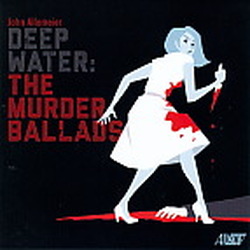
American Record Guide
September/October 2014
John Allemeier’s program is singular for two reasons. The first is that the inspiration is murder ballads and the second is that there are no vocals to sing the ballads. The stories behind Frankie Silver, Omie Wise, and poor Ellen Smith are fascinating. A soured love affair, an allegation of self defense, and a gullible maiden (or was she looking for a bribe?) are great backdrops for musical settings. Pieces of Silver, concerning Frankie Silver’s murder of her husband with an axe, uses a mixed instrumentation of clarinet, flute, violin, cello, and percussion. The three-movement piece mirrors the tale quite well, beginning with birdcalls and flutterings representing the “hunting trip” the husband had taken. Arpeggios spanning more than an octave create the gentle sense of rocking an infant child. Duets are conversations between characters that lead directly to a cymbal crash murder. III,
`Confrontation’, portrays Frankie’s only supposed regret that she would have to see her spouse again after her execution. Motion abounds and tension builds with all the instruments as a recapitulation of the hunting themes conclude the piece. Poor Ellen is a two movement string quartet that depicts a flowering romance with a bright, dancing opening before the folk music turns somber and relates directly to the original ballad with quotations and mood. What may be best about Allemeier’s compositions are how filled they are are with moments of extra-musical significance. He treats the source materials and the legends surrounding them with such fondness while presenting his own treatment of them that it is hard not to get sucked in.
September/October 2014
John Allemeier’s program is singular for two reasons. The first is that the inspiration is murder ballads and the second is that there are no vocals to sing the ballads. The stories behind Frankie Silver, Omie Wise, and poor Ellen Smith are fascinating. A soured love affair, an allegation of self defense, and a gullible maiden (or was she looking for a bribe?) are great backdrops for musical settings. Pieces of Silver, concerning Frankie Silver’s murder of her husband with an axe, uses a mixed instrumentation of clarinet, flute, violin, cello, and percussion. The three-movement piece mirrors the tale quite well, beginning with birdcalls and flutterings representing the “hunting trip” the husband had taken. Arpeggios spanning more than an octave create the gentle sense of rocking an infant child. Duets are conversations between characters that lead directly to a cymbal crash murder. III,
`Confrontation’, portrays Frankie’s only supposed regret that she would have to see her spouse again after her execution. Motion abounds and tension builds with all the instruments as a recapitulation of the hunting themes conclude the piece. Poor Ellen is a two movement string quartet that depicts a flowering romance with a bright, dancing opening before the folk music turns somber and relates directly to the original ballad with quotations and mood. What may be best about Allemeier’s compositions are how filled they are are with moments of extra-musical significance. He treats the source materials and the legends surrounding them with such fondness while presenting his own treatment of them that it is hard not to get sucked in.